Core Fruit CEO Nico van Staden hopes that the export company, which ships a wide array of fruit to 120 ports, can catch up with grape volumes from the Western Cape; they received around a fifth less grapes from Limpopo and the Orange River Valley than usual.
Core Fruit usually handles between 4.5 million and 5 million 4.5kg cartons of grapes in a season.
He remarks that on the whole, South Africa’s grape exports to Asia are definitely down while sales to Europe have increased. It could be ascribed to the lighter weight of South African grape berries, making them more suitable for punnets, which are Europe’s preference. (Grape sales to the United Kingdom are more or less the same.)
“We’re told that grape consumption is down in Europe. We need to look into the reasons for that. Retailers have said: ‘If we don’t promote, we don’t get sales.’ Grapes are a very expensive product per kilogram. We have more options on apples, pears and citrus than on table grapes where the EU and the UK constitute our biggest markets,” he explains.
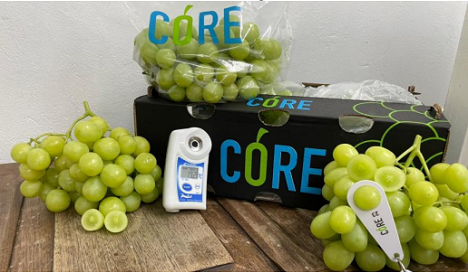
"Growers all around the world are under huge pressure due to high input cost and therefore we must try our best to increase foreign currency prices."
Another facet of their responsibility towards growers is to look for new places to sell, for instance table grapes in Africa which already takes the majority of South Africa’s apples.
“We’ve started to develop Africa but very few of our buyers in Africa can take a full container of grapes. We send them grapes with a mix of apples and pears.”
This time of year, besides table grapes, Core Fruit exports stone fruit and they’re just starting with mangoes.
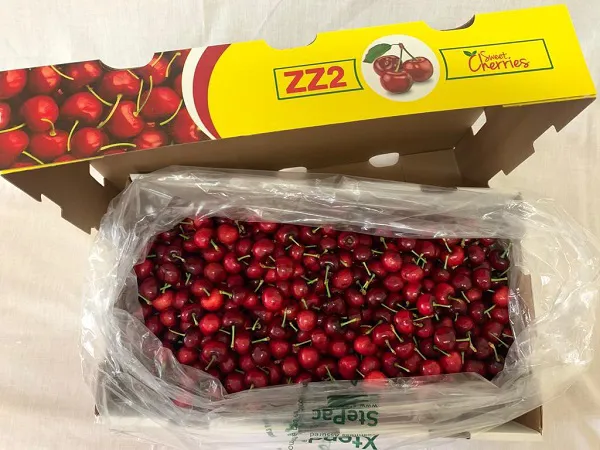 Core Fruit exports ZZ2's cherries
Core Fruit exports ZZ2's cherries
Nico concedes that South Africa is fighting for stone fruit shelf space during the Northern winter, but early demand was good since Europe ended earlier.
Plums need more markets; in the UK and Europe there is a downward trend in plum consumption.
“Consumption is not where we want it to be, but in truth we expected that because of the current economic climate. We sell a lot of our stone fruit in the Middle East and the Eastern markets and Africa.”
Over the past few years many new plum orchards had been established, at times proceeding overhastily with untried new varieties in new localities which did not always live up to expectations. Mistakes like those cannot be afforded anymore, he says.
Unprecedented summer hail and rain in Western Cape 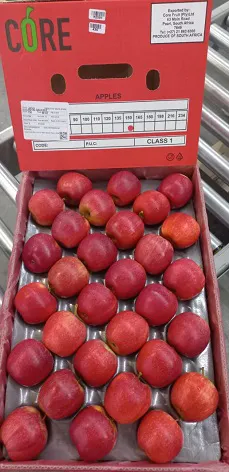 “We had very severe hail damage on apples and pears in the Ceres area and it was from four separate hail storms on different days over various localities - we’ve never seen that before,” Nico says of the hail this summer in what is, in fact, a winter rainfall area.
“We had very severe hail damage on apples and pears in the Ceres area and it was from four separate hail storms on different days over various localities - we’ve never seen that before,” Nico says of the hail this summer in what is, in fact, a winter rainfall area.
“Here in the Cape we had 100mm+ of rainfall in December and that’s very abnormal. Climate change is definitely something we have to look at very carefully.”
Stone fruit was also affected by the December rain and, remarks Nico, less stable weather has definitely been a trend over the past two years.
They’ve managed to build up their Africa business over the past decade as Europe and the UK have become ever more self-sufficient in apples and pears. India too has emerged as a big market for South African apples and pears.
“We sell a lot to China where we offer varieties that they don’t have. The big advantage now is that we got access to China for pears last year and it’s been going very well.”
Promising soft citrus & avocado seasons ahead
Nico notes that the citrus season is early with the first lemon exports by mid-January.
Likewise the avocado season – Core Fruit handles all of ZZ2’s avocados – could start by week 6 already. The avocado season is looking promising, Nico remarks, because Spain and Israel are both expected to have smaller crops after last year’s bumper avocado harvests.
“The same on citrus: 80% of our citrus volumes are soft citrus, and Spain and Morocco are down on their soft citrus this year.”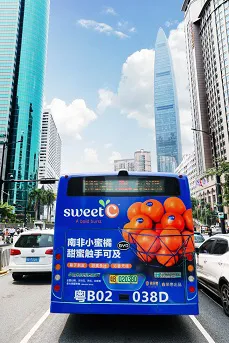 The company follows a dual strategy of open exports and brand-led exports, notably the ClemenGold/LemonGold/Sweet C late mandarin.
The company follows a dual strategy of open exports and brand-led exports, notably the ClemenGold/LemonGold/Sweet C late mandarin.
Right: a Sweet C late mandarin promotion in Shanghai
Following the Nadorcott season from South Africa, Core Fruit also exports Moroccan-grown Nadorcotts, to extend the branding campaign of ClemenGold and Sweet C.
On apples, pears, grapes, stone fruit and avocados Core Fruit only works within the South African season. They further offer pomegranates (a crop that is more difficult to grow than it might look, he remarks) and very small volumes of persimmons.
Future of blueberries is varietal-specific
Nico is excited about Fall Creek’s Sekoya range, for which they hold a license with 13 other licensees around the world.
“Fall Creek has fantastic varieties and Sekoya spends a lot of money on branding, like what Fruitalyst is doing with Clemengold, LemonGold and Sweet C. That’s important because we think the opportunity in the blueberry category is to differentiate yourself with good eating varieties and branding.
Only four varieties currently satisfy the Sekoya brand’s high specifications of crunchiness, eating quality, berry size and shelf life.
“The same trend as we see with grapes and all other products is that customers will ask for good eating quality blueberries.”
Studies have shown, he says, that customers with a bad experience with blueberries take 12 weeks to make a repeat purchase.
“It’s a people business”
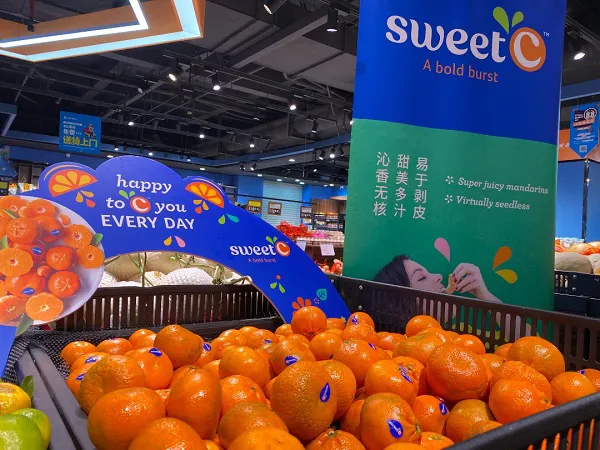 Soft citrus branding sets an example for blueberry marketing
Soft citrus branding sets an example for blueberry marketing
Nico observes that Core Fruit’s biggest growers are big enough to do their own export, but the reason that they entrust their product to Core Fruit is that the company is able to add value through sustainable returns, a trusting transparent long term relationship and to be part of a bigger eco system.
“In China, India, the Far East, the Middle East and Africa we have customers who buy the whole basket from us which assists us with 12 month business, and it brings overheads down and gives us leverage with customers. As a business, our advantage is we have good quality product every day of the week.”
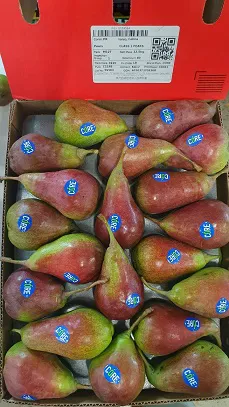 Maintaining low margins and high efficiency has been their game plan, he says, noting that 75% of their costs is their salary bill.
Maintaining low margins and high efficiency has been their game plan, he says, noting that 75% of their costs is their salary bill.
“This is a people business and that’s why you need to have experienced people, especially with the conditions that we face at the moment.”
He points out that since 2010, South African fruit exports have increased by about 65% to over 350 million cartons, which is a big advantage for the country.
“We have some of the best farmers around the world, good weather, lots of sunshine and good eating quality, which makes South Africa a great supplier of fruit."
He continues: "We, together with our grower base, want to make use of this wonderful opportunity. People still buy a lot of fruit.”
Core Fruit will be at Fruit Logistica at Hall 26/D51.  For more information:
For more information:
Nico van Staden
Core Fruit
Tel: +27 21 863 6300
Email: [email protected]
https://www.corefruit.com/










